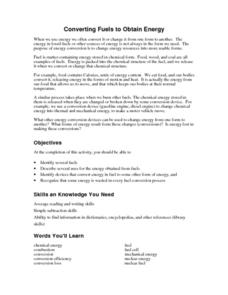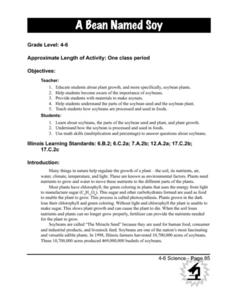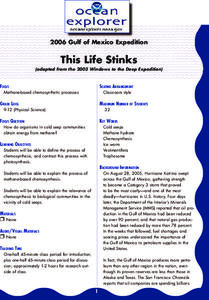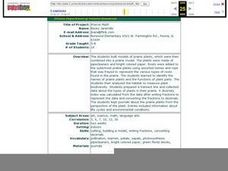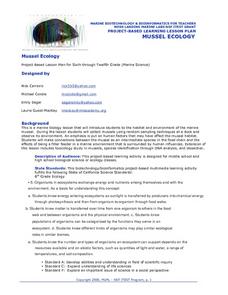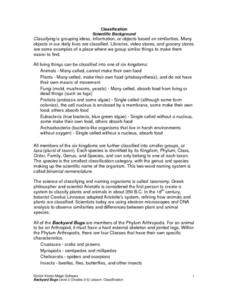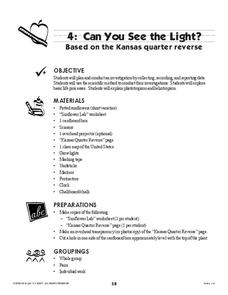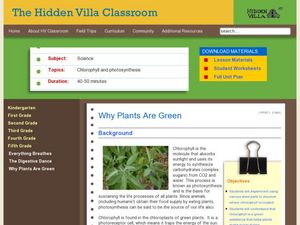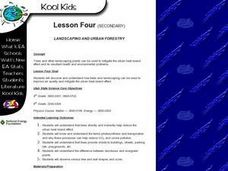Curated OER
Producers and Consumers
Students make lists of producers and consumers and act as consumers that eat producers in a garden. In this producers and consumers lesson plan, students demonstrate a food chain by using a piece of yarn to connect all of them together.
Curated OER
Weather Lesson 1
Students describe and compare the layers of the atmosphere. They explain how to measure the temperature of the atmosphere. They also explain what causes the atmosphere to heat up in some places more than in others.
Curated OER
Converting Fuels to Obtain Energy
Students experiment with converting fuels to energy. They also must identify different types of fuels and ways to conserve energy.
Curated OER
Design a Reef!
Here is an ambitious, but highly valuable undertaking: set up a miniature coral reef in your classroom. Young marine scientists research coral reef ecosystems and ensure all vital factors are included in their functioning model. The...
Curated OER
WET Science Lesson #11: How Light Affects Water
Scientists listen to the story of Wadja Egnankou who works to save African mangrove forests. They experiment with refraction and the introduction of particulate matter to water. They conclude with creative writing about the need for a...
Curated OER
Prairie In A Bottle
Second graders observe images of prairie ecosystems and discuss the needs of living things. They create a prairie habitat in a closed jar to observe the water cycle and plant growth.
Curated OER
Soybeans: The Miracle Seed
Students discover why soybeans are called the "miracle seeds." They make their own soynuts and share other foods made from soybeans. They create a bulletin board of soybean products.
Curated OER
Life is Weird
Separate your science class into small groups and assign each a specific deep-sea organism to research. The class will learn about all of the organisms as each group presents their assigned animal. Following their presentations, you can...
Curated OER
This Life Stinks
Chemosynthetic communities of cold seep areas are considered in this lesson. Working in collaborative groups, marine biology or oceanography learners research and prepare a report about oxidation-reduction reactions involved with...
Curated OER
Prairie Math
Students work together to build models of prairie plants. Using the model, they estimate the height and then measure them using metric and standard units. They write a fraction to represent their part of the whole set and compare and...
Curated OER
Mussel Ecology
Students are introduced to the marine environment of the mussel. The emphasis of the instructional activity is upon what human factors are present to influence the environment in positive and negative ways. They brainstorm in groups in...
Curated OER
Soil Nutrients - Phosphorus Lab Lesson Plan
Students list sources of phosphorus in soil. They explain how phosphorus is removed from the soil and used by plants. Students list the symptoms of insufficient or excess phosphorus. Students perform experiments to examine the effect of...
Curated OER
Backyard Bugs
Explore the concept of scientific classification and the similarities and differences between plant and animal species. Your class will participate in hands-on activities by investigating dichotomous keys and classifying their shoes. To...
Curated OER
Entering The Twilight Zone
In this lesson sixth grade students get into groups and research a given ocean habitat. The major features of cold-seep communities are the objective but plenty information is given about other habitats which could be assigned to...
Curated OER
Coral Polyp Party
Learners complete a project where they label the parts of a coral polyp and discuss the differences between plants and animals. Students use marshmallows, sprinkles, toothpicks, and more to label their coral polyp.
Curated OER
Can You See the Light?
Explore plants and flowers with this activity. Learners talk about plants, conduct an experiment with suflowers, and track a plants growth. This is a motivating way to present this concept.
Curated OER
Alcoholic Fermentation in Yeast
Biology learners investigate the effect of sucrose concentration on yeast alcoholic fermentation. During the lesson,they compare and contrast the processes of cellular respiration and alcoholic fermentation. They design an experiment to...
Curated OER
Iron Fertilization - Pumping Iron
The theory that adding iron to ocean water may increase phytoplankton ability to remove carbon dioxide from the atmosphere is examined. The Monterey Bay Aquarium Research Institute is monitoring conditions off the California coast to...
Curated OER
Links in a Food Chain
Little ones make costumes and act out a rhyme in which there are daisies, bugs, wrens, snakes, and foxes that all interact in a food web. This would be a memorable activity for primary life scientists to participate in as a wrap-up to a...
Curated OER
Why Plants Are Green
Students discover the properties of chlorophyll in plants. In this plant biology lesson, students conduct an experiment to find where the chlorophyll in the plant is located. Students are split into small groups and study plant parts....
Curated OER
Plant Transpiration
Young scholars conduct various experiments to investigate plant transpiration. For this biology lesson, students explain how this process helps maintain the hydrologic cycle. They measure the rate of water loss in plants using a potometer.
Curated OER
Landscaping And Urban Forestry - Lesson 4 (Grades 8-9)
Students discuss reasons to plant trees and the best locations for cooling. They study two homes and identify types and locations of trees and determine the placement of the central air conditioners. The class plans a landscape design...
Curated OER
Where Do Plants Get Their Food?
Young scholars think about the historical development of the scientific method. They design an experiment that replicates van Helmont's, using only specified materials. Pupils then improved upon van Helmont's procedure and also...
Curated OER
Leaf Chromatography
In this leaf chromatography worksheet, learners separate the pigments of a leaf using paper chromatography. They answer 4 questions about their results and draw the colors they observe on their chromatogram from the leaf.
Other popular searches
- Photosynthesis Worksheets
- Photosynthesis Crossword
- Photosynthesis & Respiration
- Photosynthesis Lab
- Photosynthesis Role Play
- Biology Lab Photosynthesis
- Photosynthesis in Plants
- Science Photosynthesis
- Photosynthesis / Respiration
- Plant Biology Photosynthesis
- Photosynthesis and Respiration
- Unit Photosynthesis




